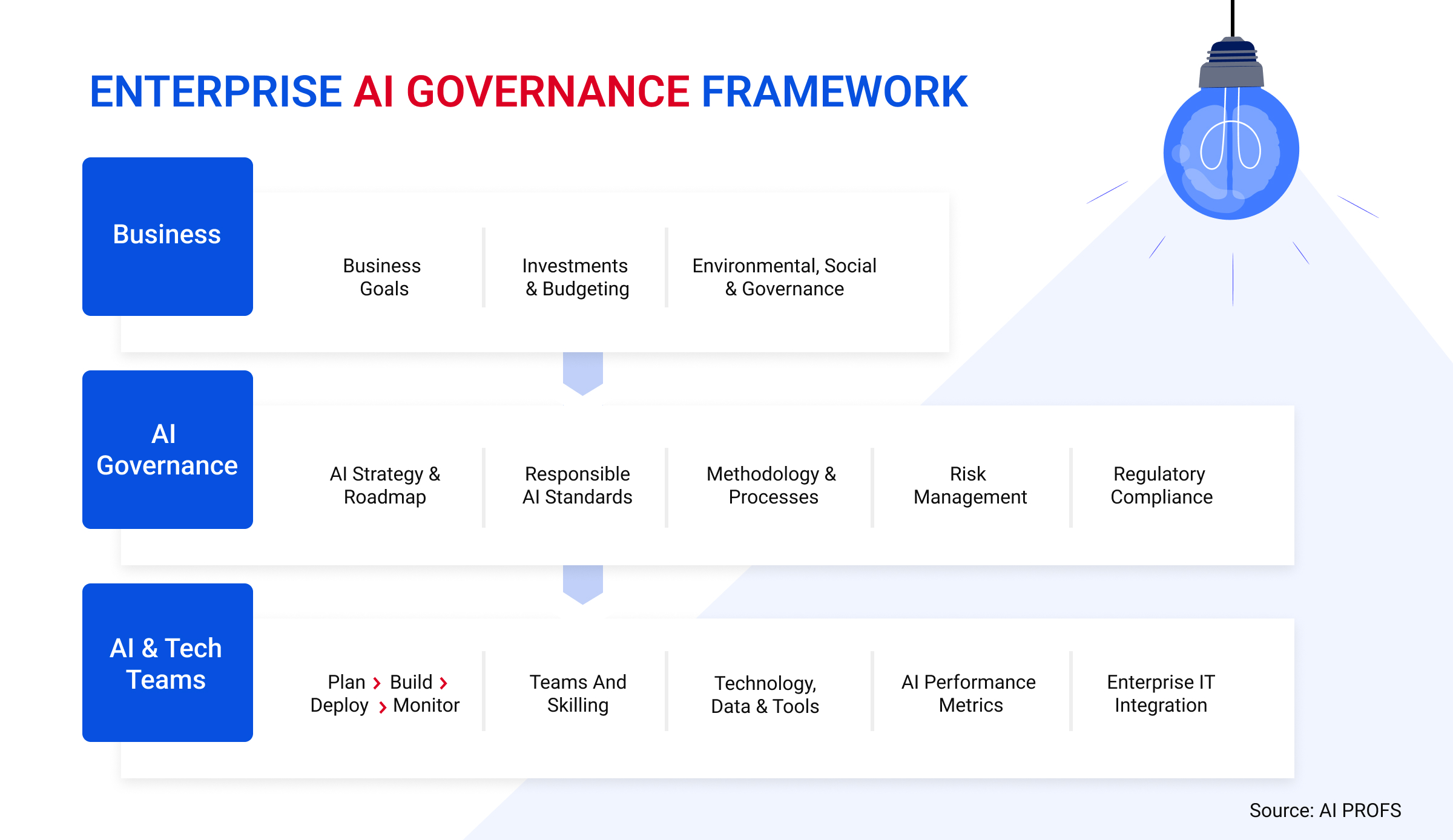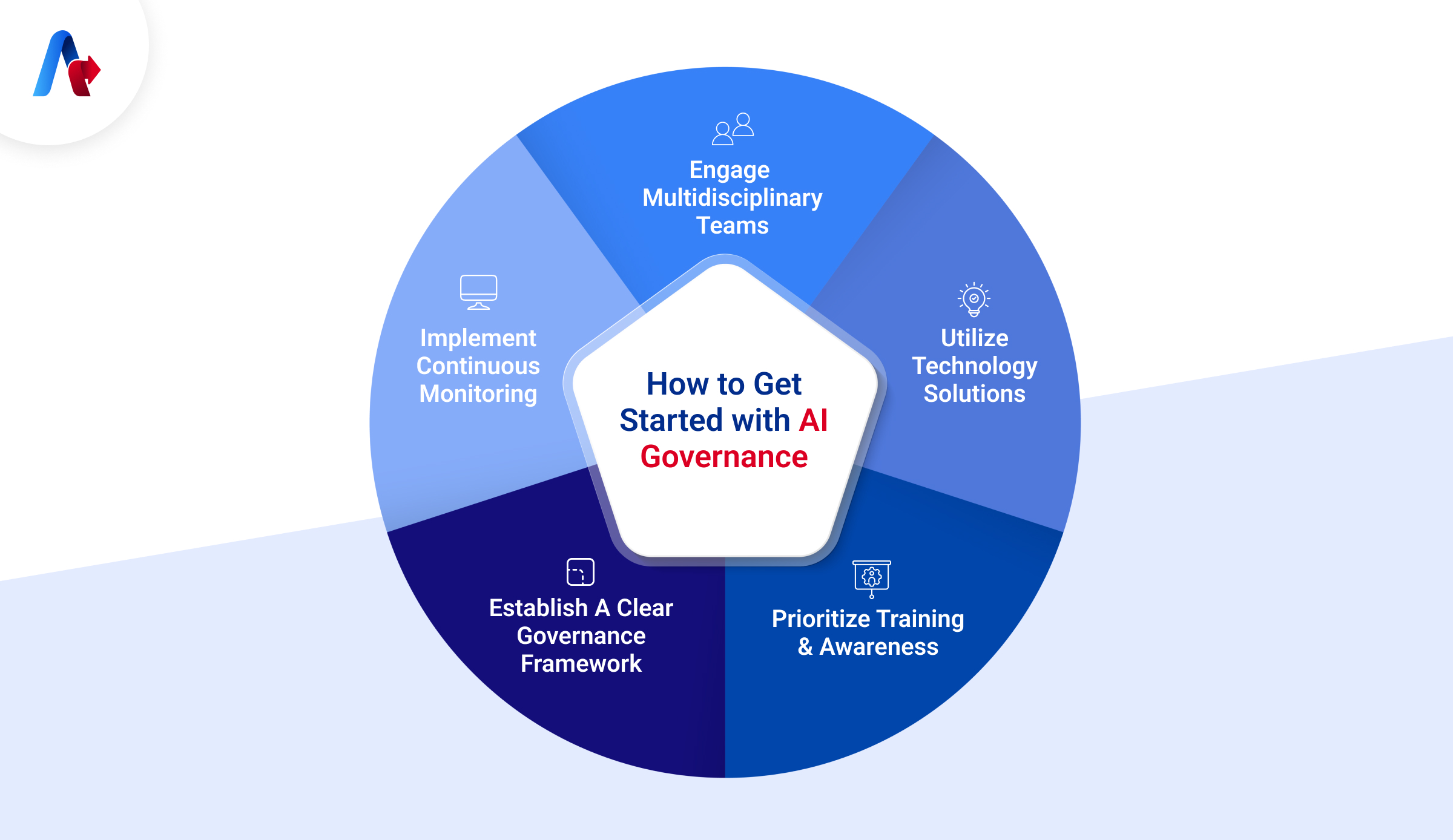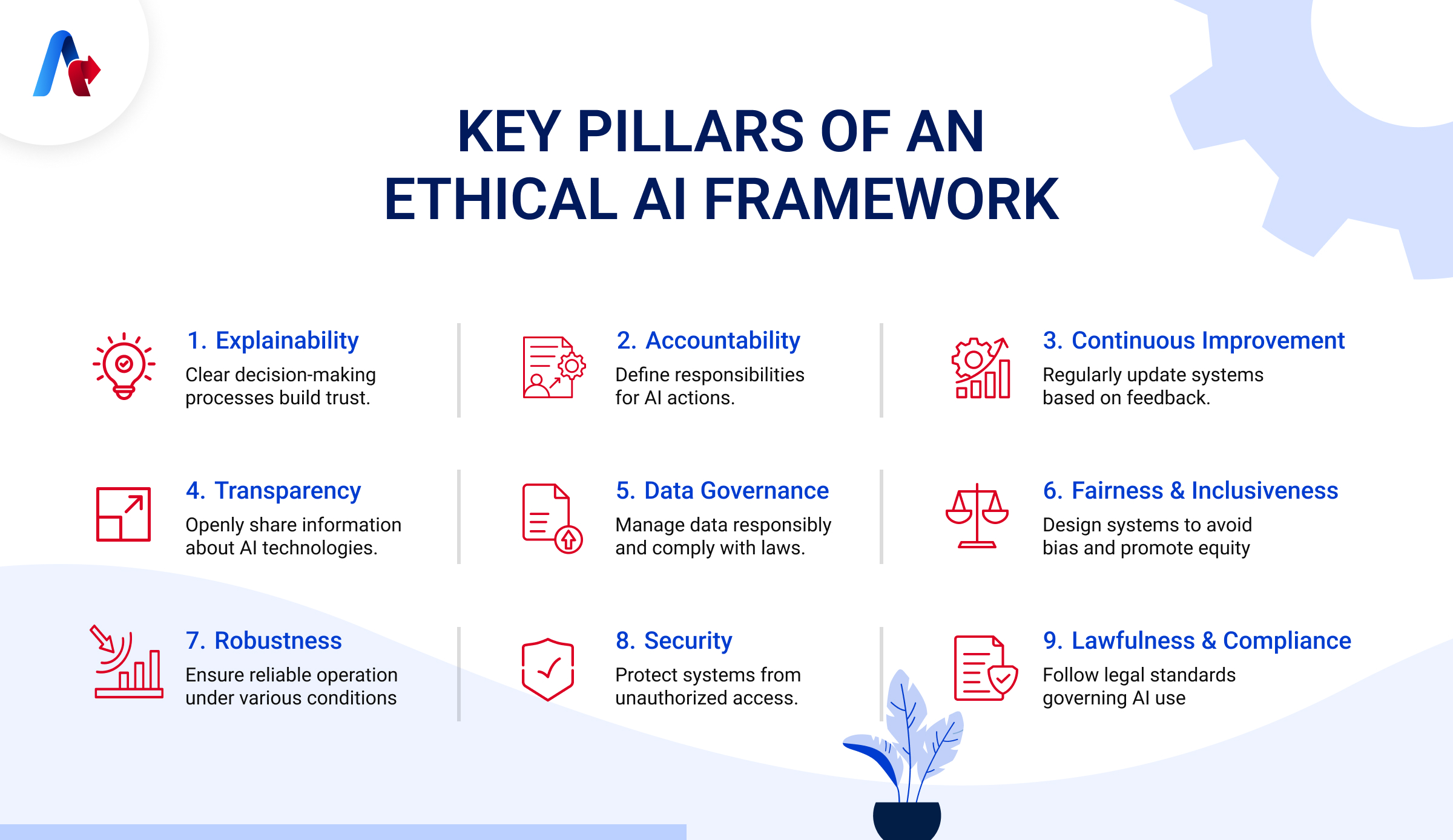AI Governance
BLOG
Generative AI is rapidly becoming an integral part of businesses in their daily operations. It was only a year or two ago that people were still trying to determine the capabilities of AI. But now, everyone is thinking about it. It's on everyone's radar. While many have already accepted this innovative technology, others are still weighing its pros and cons. In 2024, businesses saw a sharp surge in the use of generative AI and experienced significant benefits. And the numbers back it up!
According to the latest McKinsey Global Survey on AI, 65 percent of organizations are now regularly using Generative AI, nearly double the percentage from just a few months ago, underscoring the need for effective AI governance frameworks.
But despite all of the amazing advantages that generative AI offers, there are also a lot of obligations. It is imperative for enterprises to guarantee that their artificial intelligence systems adhere to moral principles, conform to legal requirements, safeguard intellectual property, and honor privacy concerns. This is where AI governance acts as a bridge between the exciting potential of technology and the need for ethical responsibility.
Looking to establish ethical AI practices?
Talk to Our Experts Today!What is AI Governance?
The set of guidelines that ensure the responsible development and deployment of artificial intelligence is known as AI governance. In addition to its ability to transform industries and automate processes, AI has significant organizational, ethical, and legal ramifications.

The increase in the integration of AI into our daily lives and work processes underscores the need for a solid governance structure. Without it, businesses become vulnerable to problems like invasive privacy, biased algorithms, and the improper application of AI, leading to negative consequences. For this reason, creating a strong framework for AI governance is essential to guaranteeing accountability, transparency, and responsible application of AI.
In short, an AI governance framework gives organizations a structured way to manage and navigate the ethical challenges that come along the way with AI implementation.
A recent estimate from McKinsey & Company shows that Generative AI (like ChatGPT and similar applications) could add between $2.6 trillion and $4.4 trillion annually to business revenues. Most of this value will come from using Generative AI in customer operations, marketing and sales, software engineering, and research and development.
What’s your strategy for ethical and sustainable AI growth?
Tell Us!Why is AI Governance Important for an Organization?
Although the definition of AI governance has already been discussed, the main question lies in: Why is AI governance such an important part of an organization? AI governance is important because it creates a framework to guarantee the ethical and responsible use of artificial intelligence. The following are some of the points that can be considered to sum up the significance of AI governance.

1. Ensuring Safety and Fairness
AI governance aids in the management of the risks that come with AI technologies, including potential privacy violations and decision-making biases. Prominent events show how AI can seriously affect society in the absence of adequate control, such as the skewed results from AI tools (like the Tay chatbot and the COMPAS software). According to a recent post published by Dataversity, the purpose of the AI governance framework is to encourage the ethical application of technology in a way that makes its use transparent, safe, private, responsible, and impartial.
2. Establishing Trust
Establishing robust artificial intelligence governance frameworks within enterprises cultivates stakeholder confidence. Gaining the trust of clients and staff requires transparency in the way AI systems function and make choices. This trust is crucial since companies are depending more and more on AI to handle vital tasks like fraud and cybersecurity.
In fact, over 50% of businesses use AI for cybersecurity and fraud management purposes, according to Forbes Advisor.
3. Compliance with Regulations
Organizations must abide by the restrictions imposed by governments across the globe regarding the use of AI in order to avoid facing legal implications. A strong enterprise AI governance framework encourages moral behaviour inside the company and helps guarantee compliance with these laws.
4. Promoting Accountability
Clear duties and responsibilities for the usage of AI inside a business are made possible by a well-structured framework for AI governance. In order to guarantee that AI technologies are applied morally and sensibly throughout their lifecycle, accountability is crucial.
5. Encouraging Innovation
Through the implementation of a strong AI governance framework, enterprises may efficiently manage risks and foster innovation. This equilibrium enables businesses to take advantage of AI while limiting its drawbacks.
How Should Businesses Handle AI Governance?
Organizations should adhere to tactics that protect them from any threats and improve the overall efficacy of AI deployments in order to successfully implement AI governance and manage the risks connected with AI. Let's examine a doable strategy for implementing AI governance in businesses.

1. Establish a Clear Governance Framework
Establishing a thorough AI governance framework that delineates roles, regulations, and procedures for overseeing AI systems across their entire lifecycle is important for organizations. Guidelines for the creation and application of ethics should be part of this framework.
2. Involve Multidisciplinary Teams
Effective governance necessitates cooperation between the domains of technology, law, ethics, and business. Incorporating varied viewpoints guarantees an all-covered supervision and tackles the complex issues presented by artificial intelligence.
3. Put Continuous Monitoring into Practice
It is recommended that organizations set up procedures for continuous assessment of their AI systems in order to guarantee adherence to legal and ethical requirements. Frequent audits can assist in early risk identification.
4. Make Training and Awareness You Top Priority
It is imperative to allocate resources towards employee education programs that cover AI governance principles. A culture of accountability is established inside the company when staff members are aware of their responsibility in employing AI properly.
5. Make Use of Technology Solutions
Technology tools for enterprise AI governance, such as dashboards that offer real-time insights into the effectiveness and compliance of AI models, can be utilized by organizations. These tools promote transparency and aid in monitoring the success of governance initiatives.
9 Principles of an AI Governance Framework
The cornerstone of prudent AI use is good governance. It guarantees that artificial intelligence (AI) tools are applied morally to improve decision-making. It is more than just following the rules, as an AI governance framework gives firms a mechanism to manage the ethical considerations around AI. The goal of the AI governance framework is to increase stakeholder and user confidence. Let's examine the nine fundamental tenets of ethical AI, which can direct you toward a more secure and effective AI deployment.

1. Explainability
A key component of explainability is ensuring that AI systems can articulate their decision-making processes. Users are more inclined to trust the system when they are aware of how results are determined.
Why it Matters: People are more comfortable utilizing technology if they are aware of the decision-making process.
Example: When it comes to credit scoring systems, candidates ought to know what elements affected their results.
2. Accountability
To ensure accountability, it's important to identify exactly who is in charge of the decisions made by AI systems. If something goes wrong, such as biased results, there ought to be a defined procedure in place for handling it.
Why it Matters: Establishing accountability makes it possible to hold wrongdoers accountable.
Example: If an autonomous vehicle causes an accident, there ought to be a procedure in place for figuring out who is responsible.
3. Security
Data integrity and protection against unwanted access are two aspects of security for AI systems. Users are more likely to trust technology in a secure environment.
Why it Matters: As cyber threats grow more complex, strong security measures are essential.
Example: Using encryption can help protect sensitive data processed by AI systems.
Is your business following any of these AI governance best practices?
Let’s Discuss!4. Transparency
Organizations must be transparent in order to freely share information about their AI technologies. Among users, this transparency promotes trust.
Why it Matters: Users can comprehend decision-making processes better when firms are open and honest about how their systems operate.
Example: Companies should disclose how their algorithms function and what data they use.
5. Inclusivity and Fairness
AI systems need to be created to treat everyone fairly and impartially. This principle encourages inclusivity across different demographics.
Why it Matters: Biased algorithms can result in discrimination and social inequalities.
Example: An organization might implement checks within its hiring algorithms to prevent bias against certain groups.
6. Information Management
Data governance is the responsible management of data while guaranteeing privacy legal compliance. Personal data must be safeguarded by organizations at all stages of its existence.
Why it Matters: Individual rights are protected by effective data governance.
Example: Organizations should anonymize user data before using it in training datasets for machine learning models.
7. Robustness
Ensuring AI systems are robust means ensuring they can function consistently in a variety of environments without malfunctioning or having unexpected effects.
Why it Matters: Reliable systems reduce the risks brought on by unforeseen circumstances.
Example: An autonomous drone should have fail-safes in place to handle technical malfunctions safely.
8. Legality and Adherence
Organizations using AI technologies are subject to legal requirements. To operate ethically, one must abide by laws like the GDPR.
Why it Matters: Violating the law can result in fines and harm to one's reputation.
Example: Companies should regularly check their AI systems for compliance with relevant laws.
9. Continuous Enhancement
This idea places a strong emphasis on routinely reviewing and modifying AI systems in terms of fresh information or user input.
Why it Matters: Constant improvement ensures that systems are still efficient and compliant with moral principles.
Example: Organizations might conduct periodic reviews of their algorithms based on user feedback to identify areas for improvement.
The Future of AI Requires Ethical Leadership
AI governance will become increasingly crucial as AI gradually becomes more integrated into our daily lives. Adopting a robust framework for AI governance involves not just risk management but also recognizing and responsibly utilizing AI's full potential. Businesses that put these principles first will not only reduce risks but also gain the trust of their stakeholders and users, establishing them as pioneers in the moral use of AI. From ensuring transparency and fairness to fostering innovation while minimizing risks, good governance is the core of a secure AI-driven future. With a trusted Gen AI service provider like Accelirate onboard, your AI implementation is in safe hands.
Need help with responsible AI governance strategy?
Let us know!FAQs
Globally, AI governance is being applied in a variety of ways. Among the more effective instances are:
AI Bill of Rights (USA): The USA's AI Bill of Rights proposal highlights the need for transparent, secure, and accountable AI systems.
Canada’s AI and Data Act: The AI and Data Act of Canada is a framework designed to control the advancement and application of AI in the country.
EU AI Act: The EU AI Act is a comprehensive regulation that assigns higher risks to AI systems and places more stringent guidelines on those applications.
OECD AI Principles: Adopted by over 40 nations, these principles promote ethical and trustworthy AI systems, concentrating on transparency, justice, and accountability.
Singapore’s Model AI Governance Framework: Offers instructions and guidelines to businesses on how to implement ethical AI policies that prioritize transparency and responsibility.
Organizations can assess how effectively they are controlling their AI systems with the use of certain metrics for AI governance. For example:
Data Quality: Ensuring the accuracy and dependability of the data utilized in AI models.
Bias Monitoring: Consistently examining AI systems for biases to guarantee equitable results.
Compliance Rates: Monitoring adherence to internal policies and regulatory guidelines on the use of AI
Transparency Levels: Evaluating how well firms explain their AI processes to stakeholders.
Incident Reports: Keeping tabs on the number of issues or breakdowns involving AI systems.
Within an enterprise, AI governance is a shared duty. Important participants consist of:
CEO and Senior Leadership: They are ultimately responsible for ensuring and implementing an efficient AI governance framework and its ethical use.
Audit Teams: These teams evaluate the accuracy and consistency of the data utilized in AI systems to make sure there are no biases or mistakes.
CFO: In charge of overseeing the financial elements of AI projects, including risk and budget management.
Cross-Departmental Collaboration: Effective governance includes input from multiple departments, including IT, legal, ethics, and compliance teams.


